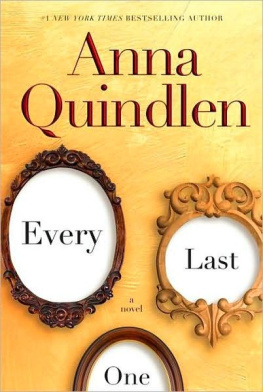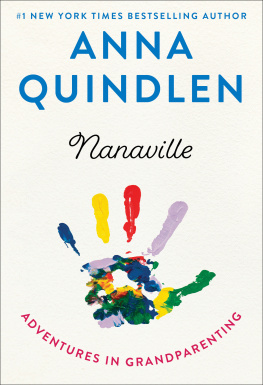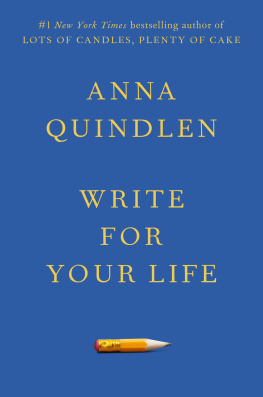ALSO BY ANNA QUINDLEN
Good Dog. Stay
Rise and Shine
Being Perfect
Blessings
A Short Guide to a Happy Life
How Reading Changed My Life
Black and Blue
One True Thing
Object Lessons
Living Out Loud
Thinking Out Loud
BOOKS FOR CHILDREN
Happily Ever After
The Tree That Came to Stay

For my children, who saved my life
There is an evening coming in
Across the fields, one never seen before,
That lights no lamps . Silken it seems at a distance, yet
When it is drawn up over the knees and breast
It brings no comfort . Where has the tree gone, that locked
Earth to the sky? What is under my hands,
That I cannot feel? What loads my hands down? --PHILIP LARKIN

This is my life: The alarm goes off at five-thirty with the murmuring of a public-radio announcer, telling me that there has been a coup in Chad, a tornado in Texas. My husband stirs briefly next to me, turns over, blinks, and falls back to sleep for another hour. My robe lies at the foot of the bed, printed cotton in the summer, tufted chenille for the cold. The coffeemaker comes on in the kitchen below as I leave the bathroom, go downstairs in bare feet, pause to put away a pair of boots left splayed in the downstairs back hallway and to lift the newspaper from the back step. The umber quarry tiles in the kitchen were a bad choice; they are always cold. I let the dog out of her kennel and put a cup of kibble in her bowl. I hate the early mornings, the suspended animation of the world outside, the veil of black and then the oppressive gray of the horizon along the hills outside the French doors. But it is the only time I can rest without sleeping, think without deciding, speak and hear my own voice. It is the only time I can be alone. Slightly less than an hour each weekday when no one makes demands.
Our bedroom is at the end of the hall, and sometimes as I pass I can hear the children breathing, each of them at rest as specific as they are awake. Alex inhales and exhales methodically, evenly, as though he were deep under the blanket of sleep even though he always kicks his covers askew, leaving one long leg, with its faint surgical scars, exposed to the night air. Across the room Max sputters, mutters, turns, and growls out a series of nonsense syllables. For more than a year, starting when he was eleven, Max had a problem with sleepwalking. I would find him washing his hands at the bathroom sink or down in the kitchen, blinking blindly into the open refrigerator. But he stopped after his first summer at sleepaway camp.
Ruby croons, one high strangled note with each exhale. When she was younger, I worried that she had asthma. She sleeps on her back most of the time, the covers tucked securely across her chest, her hair fanned out on the pillows. It should be easy for her to slip from beneath the blanket and make her bed, but she never bothers unless I hector her.
I sit downstairs with coffee and the paper, staring out the window as my mind whirrs. At six-thirty I hear the shower come on in the master bath. Glen is awake and getting ready for work. At six forty-five I pull the duvet off Ruby, who snatches it back and curls herself into it, larval, and says, "Ten more minutes." At seven I lean over, first Alex, then Max, and bury my nose into their necks, beginning to smell the slightly pungent scent of male beneath the sweetness of child. "Okay, okay," Alex says irritably. Max says nothing, just lurches from bed and begins to pull off an oversized T-shirt as he stumbles into the bathroom.
There is a line painted down the center of their room. Two years ago they came to me, at a loose end on a June afternoon, and demanded the right to choose their own colors. I was distracted, and I agreed. They did a neat job, measured carefully, put a tarp on the floor. Alex painted his side light blue, Max lime green. The other mothers say, "You won't believe what Jonathan"--or Andrew or Peter--"told me about the twins' room." Maybe if the boys had been my first children I would have thought it was insane, too, but Ruby broke me in. She has a tower of soda cans against one wall of her bedroom. It is either an environmental statement or just one of those things you do when you are fifteen. Now that she is seventeen she has outgrown it, almost forgotten it, but because I made the mistake of asking early on when she would take it down she never has.
I open Ruby's door, and although it doesn't make a sound--she has oiled the hinges, I think, probably with baby oil or bath oil or something else nonsensically inappropriate, so we will not hear it creak in the nighttime--she says, "I'm up." I stand there waiting, because if I take her word for it she will wrap herself in warmth again and fall into the long tunnel of sleep that only teenagers inhabit, halfway to coma or unconsciousness. "Mom, I'm up!" she shouts, and throws the bedclothes aside and begins to bundle her long wavy hair atop her head. "Can I get dressed in peace, please? For a change?" She makes it sound as though I constantly let a bleacher full of spectators gawk as she prepares to meet the day.
Only Glen emerges in the least bit cheerful, his suit jacket over one arm. He keeps his white coats at the office. They are professionally cleaned and pressed and smell lovely, like the cleanest of clean laundry. "Doctor Latham" is embroidered in blue script above his heart. From upstairs I can hear the clatter of the cereal into his bowl. He eats the same thing every morning, leaves for work at the same time. He wears either a blue or a yellow shirt, with either a striped tie or one with a small repeating pattern. Occasionally, a grateful patient gives him a tie as a gift, printed with tiny pairs of glasses, an eye chart, or even eyes themselves. He thanks these people sincerely but never wears them.
He is not tidy, but he knows where everything is: on which chair he left his briefcase, in what area of the kitchen counter he tossed his wallet. He does something with the corners of his mouth when things are not as they should be--when the dog is on the furniture, when the children and their friends make too much noise too late at night, when the red-wine glasses are in the white-wine glass rack. It has now pressed itself permanently into his expression, like the opposite of dimples.
"Please. Spare me," says my friend Nancy, her eyes rolling. "If that's the worst you can say about him, then you have absolutely no right to complain." Nancy says her husband, Bill, a tall gangly scarecrow of a guy, leaves a trail of clothing as he undresses, like fairy-tale breadcrumbs. He once asked her where the washing machine was. "I thought it was a miracle that he wanted to know," she says when she tells this story, and she does, often. "It turned out the repairman was at the door and Bill didn't know where to tell him to go."
Our washer is in the mudroom, off the kitchen. There is a chute from above that is designed to bring the dirty things downstairs. Over the years, our children have used the chute for backpacks, soccer balls, drumsticks. Slam. Slam. Slam . "It is a laundry chute," I cry. "Laundry. Laundry."
Laundry is my life, and meals, and school meetings and games and recitals. I choose a cardigan sweater and put it on the chest at the foot of the bed. It is late April, nominally spring, but the weather is as wild as an adolescent mood, sun into clouds into showers into storms into sun again.
"You smell," I hear Alex say to Max from the hallway. Max refuses to reply. "You smell like shit," Alex says. "Language!" I cry.
"I didn't say a word!" Ruby shouts from behind the door of her room. Hangers slide along the rack in her closet, with a sound like one of those tribal musical instruments. Three thumps--shoes, I imagine. Her room always looks as though it has been ransacked. Her father averts his head from the closed door, as though he is imagining what lies within. Her brothers are strictly forbidden to go in there, and, honestly, are not interested. Piles of books, random sweaters, an upended shoulder bag, even the lace panties, given that they belong to their sister--who cares? I am tolerated because I deliver stacks of clean clothes. "Put those away in your drawers," I always say, and she never does. It would be so much easier for me to do it myself, but this standoff has become a part of our relationship, my attempt to teach Ruby responsibility, her attempt to exhibit independence. And so much of our lives together consists of rubbing along, saying things we know will be ignored yet continuing to say them, like background music.
Next page







